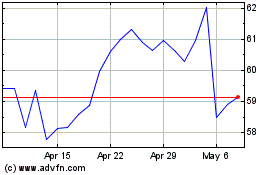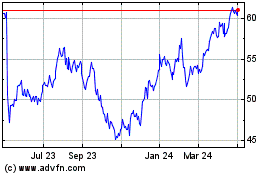By Jacob Bunge
The chief executive of Smithfield Foods Inc. said the U.S.
cannot allow coronavirus cases to derail meat industry operations,
as plant shutdowns across the country cut into food production.
Elected officials and the public must recognize meatpacking
plants as infrastructure critical to national security, said
Kenneth Sullivan, who heads the biggest U.S. pork producer. They
must work with meat companies to strengthen safety practices and
ensure plants continue to produce bacon, ground beef and chicken
breasts, he said.
"We're going to have positive Covid cases," said Mr. Sullivan,
referring to the disease caused by the coronavirus, Covid-19. "The
question is what do you do in the face of that -- do you stop the
harvest, or continue, because it's essential to life? There's only
one option there."
Meatpacking companies like Smithfield, Tyson Foods Inc., Cargill
Inc. and JBS USA Holdings Inc., owned by Brazilian meat
conglomerate JBS SA, have said they are striving to protect
workers' safety while supplying food to homebound Americans.
Some worker advocates say that the safety of processing-line
employees must be prioritized, if necessary at the expense of meat
production. In recent weeks, some meat-plant workers have walked
off the job. They have called on companies to supply protective
equipment, provide for more distance between workers or close
plants entirely to prevent more employees from getting sick.
Smithfield, which is owned by Hong Kong-based meat company WH
Group, has over the past four days announced temporary shutdowns of
three plants after health officials associated hundreds of Covid-19
cases with its operations. State and local officials in South
Dakota, where Smithfield on Sunday closed one of the country's
biggest pork-processing facilities, called for a 14-day closure to
stem the coronavirus' spread. Science and data related to Covid-19
justify that time frame, said a spokesman for South Dakota Gov.
Kristi Noem.
Mr. Sullivan said that after recent discussions with U.S.
Department of Agriculture Secretary Sonny Perdue, Smithfield hosted
a Centers for Disease Control and Prevention team at the Sioux
Falls, S.D., plant to evaluate worker-safety measures. That team
plans to visit other Smithfield plants and provide similar
guidance, Mr. Sullivan said.
Closing the Sioux Falls plant was the right decision, Mr.
Sullivan said. He declined to comment on whether Smithfield planned
to soon close other facilities. However, he said that all U.S. meat
companies now face the conundrum of if or when to close plants if
Covid-19 cases spread among employees, which he said could hold
grave consequences for the U.S. food supply.
"The right thing for Americans is that we operate these plants,"
Mr. Sullivan said. The country is grappling with an "atmosphere of
fear" over the coronavirus, he said, and public support for
meat-processing employees and keeping plants open is necessary to
help workers feel comfortable going to work.
Oxfam, the Southern Poverty Law Center, the United Food and
Commercial Workers International Union and other groups that have
advocated for protecting workers on Thursday sent a letter to meat
processors calling for paid sick leave for plant employees, new
gloves after every break, job protection for employees dealing with
illness and other measures. When Covid-19 cases are identified,
parts of the plant or the entire facility need to be shut down, the
groups said.
In some cases, boosting employee safeguards could mean slowing
down processing operations, said Minor Sinclair, director of U.S.
programs for Oxfam, an international anti-poverty group.
"Production will be compromised by that," said Mr. Sinclair.
Meat could become scarcer and more expensive as a result, he said.
"We have to accept that as a society."
Some grocery stores said coronavirus-related disruptions to the
meat industry are cutting into supplies and narrowing choices in
supermarket meat cases.
Smithfield, Tyson, Cargill, JBS and other meat companies over
the past month have offered bonus pay to processing-plant
employees, and in some cases are installing barriers between
meat-cutting stations on processing lines. Tyson on Thursday said
it would supply nonmedical face masks that all employees will be
required to wear in its facilities, from meat plants to animal feed
mills to corporate offices.
Smithfield is supplying similar face masks to employees, a
spokesman said. Mr. Sullivan said that the 111-year-old plant in
Sioux Falls, which produces 4% to 5% of the country's pork, is
putting barriers between processing-line workstations and has added
thermal-scanning equipment.
Mr. Sullivan said as coronavirus case growth slows, businesses
need to be able to reopen and operate.
"We're going to have to pivot as a country and open up," he
said.
Write to Jacob Bunge at jacob.bunge@wsj.com
(END) Dow Jones Newswires
April 16, 2020 18:18 ET (22:18 GMT)
Copyright (c) 2020 Dow Jones & Company, Inc.
Tyson Foods (NYSE:TSN)
Historical Stock Chart
From Jun 2024 to Jul 2024

Tyson Foods (NYSE:TSN)
Historical Stock Chart
From Jul 2023 to Jul 2024
